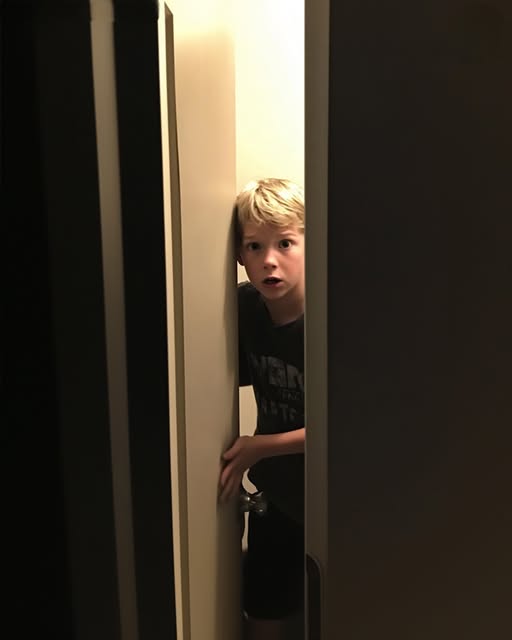Some of them were chatterboxes, some troublemakers, some brilliant beyond their years. And then there was Paul.
Eight years old, bright-eyed, polite. The kind of student every teacher dreamed of—the kind who actually wanted to learn.
While other kids passed notes or doodled in their notebooks, Paul’s were immaculate. Perfectly lined numbers, equations worked out step by step. No eraser smudges. Just focus, just determination.
And then, one day, he was gone.
I took it. And I drove straight there.
The moment I stepped into the apartment building’s dimly lit hallway, I knew something was off.
The air smelled of mildew and old cigarettes. The walls were stained, the overhead light flickering.
I found apartment 27 and knocked.
No answer.
I knocked again. Harder.
After a long, suffocating silence—the door creaked open just an inch.
And there was Paul.
He looked… smaller. His once-bright eyes were dull, sunken with exhaustion. Dark circles sat heavy beneath them, and his clothes hung loosely on his frame.
His small hand gripped the doorframe tightly, as if he were holding himself up.
“Mrs. Margaret?” His voice was barely above a whisper.
“Paul,” I breathed, relief turning instantly into concern. “Where have you been? Why haven’t you been coming to school?”
His fingers tightened on the door.
“I… I can’t,” he murmured.
My stomach twisted. “Can’t? Why not?”
His eyes darted behind him. “Mom’s not home,” he whispered.
A cold weight settled in my chest.
“Can I come in?” I asked gently.
Paul hesitated.
“I… I don’t think you should,” he said. “You—You shouldn’t see this.”
My pulse quickened.
“Paul, whatever it is, you don’t have to go through it alone. Let me help.”
For a moment, he just stood there, his small shoulders rising and falling with shaky breaths.
Then, finally—he stepped back.
And he let me in.
The apartment was small and cramped. A single-bedroom space filled with the scent of unwashed clothes and instant noodles. Dishes sat piled in the sink. A few empty soup cans lined the counter. The air was thick with something unspoken—something heavy.
And then I saw her.
A tiny girl, no older than three, sat cross-legged in the corner, clutching a worn teddy bear. Her blonde curls were tangled, her dress wrinkled. She didn’t look up, just rocked the bear back and forth, whispering something I couldn’t hear.
Paul followed my gaze.
“This is my sister, Vicky.”
I blinked. His sister?
“You… You have a sister?”
He nodded, his fingers curling at his sides. “Mom works a lot. She doesn’t have money for daycare. So I stay home with Vicky.”
I stared at him, my heart pounding.
“You’ve been taking care of her? By yourself?”
Another nod.
Something inside me cracked.
Paul was eight. He should have been in school, laughing at recess, worrying about nothing more than spelling tests and what was for lunch. Instead, he was here, in this dimly lit apartment, playing the role of a parent.
I crouched down, forcing my voice to stay steady. “Paul, how often does your mom leave you alone with Vicky?”
His eyes dropped to the floor.
“Most days,” he murmured.
“Does anyone else help?”
He shook his head. “Sometimes she leaves food, but… sometimes we just eat noodles.”
I clenched my jaw, willing my hands not to shake.
I wanted to cry.
But I didn’t.
Because Paul didn’t need my tears.
He needed help.
That night, I did something I’d never done before.
I went to the grocery store, filling my cart with everything I could think of—fresh fruit, bread, milk, real meals. Diapers for Vicky, juice boxes, snacks, anything that might make their lives a little easier.
Then, I drove back to their apartment.
When Paul opened the door, his eyes went wide.
“You don’t have to do this,” he mumbled.
I knelt and met his gaze. “Yes, I do.”
That was the beginning.
I made sure they had food. I sat down with Paul’s mother, who looked exhausted, defeated. I listened as she tearfully admitted she didn’t know what else to do.
And most importantly?
I got Paul back in school.
Fifteen Years Later
Life went on.
Hundreds of students passed through my classroom—some I remembered, some faded into memory like old chalk on a blackboard.
Then, one ordinary afternoon, my classroom door opened.
A young man in a suit stepped inside, tall, confident.
At first, I barely glanced up.
But then—he smiled.
And I knew.
I shot up from my desk, my heart pounding. “Paul?”
He nodded, his eyes crinkling at the corners.
I felt tears burn my vision. “What are you doing here?”
He didn’t answer right away. Instead, he reached into his pocket and pulled out a set of car keys, holding them out to me.
“For you,” he said.
I blinked, confused. “Paul, I—what is this?”
His smile softened. “You helped me when no one else did. You fed me when I was hungry. You taught me when I thought I’d never catch up. You saw me when the world didn’t.” His voice thickened. “And because of you… I went to college. I started my own company.”
My breath hitched.
“I wouldn’t be here if it weren’t for you,” he continued. “So… I bought you a car. It’s not enough, but… it’s something.”
Overwhelmed, words failing me, I did the only thing I could.
I pulled him into a hug.
As I held the boy—no, the man—who had once stood at his apartment door, scared and exhausted, I whispered the only words that mattered.
“I’m so proud of you, Paul.”
No warning. No note. No call. Just an empty seat in the third row where he used to sit, always eager, always ready.
At first, I thought he was sick. But a week passed. Then another.
By the second week, I went to the office.
“Have you heard anything about Paul?” I asked the secretary, Mrs. Thomas. “He hasn’t been in school for two weeks.”
She barely looked up from her paperwork. “Parents haven’t called. Probably sick.”
I frowned. “For two weeks? No updates at all?”
She sighed, finally meeting my gaze. “Mrs. Margaret, I know you care, but sometimes it’s best not to get involved in things that aren’t your business.”
A chill ran through me.
Not my business? A child had vanished from my classroom, and I was supposed to ignore it?
“Did you even try calling home?” I pressed.
She hesitated. “We… We sent a note.”
A note.
I clenched my fists. Paul wasn’t a rebellious teenager skipping school. Something was wrong.
“Do you have his home address?” I asked, voice steady.
Mrs. Thomas gave me a long, scrutinizing look before sighing and scribbling it onto a sticky note.

